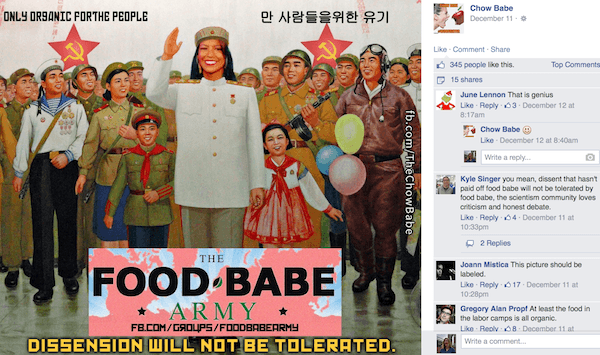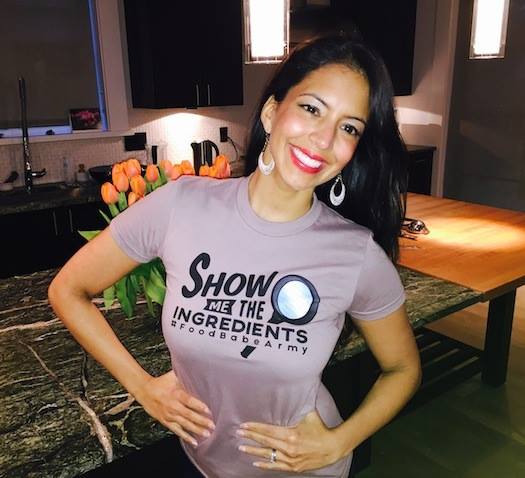What You Need to Know About the Food Babe Controversy
Update: During the reporting of this article, Dr. Kevin Folta stated that he was a neutral party and insisted he did not have monetary ties to the Council for Biotechnology, which is backed by several companies that produce GMO seeds, including Monsanto. But a recent New York Times investigation revealed that Dr. Folta was in close contact with employees at Monsanto and had projects funded by the company during the same year. The company has a huge stake in discrediting Vani Hari's anti-GMO activism, so Dr. Folta's comments, below, should not be considered neutral.
Vani Hari, AKA The Food Babe, has rocketed to food activist stardom over the last few years, picking up more than 874,000 Facebook fans and getting mega companies like Kraft, Subway, and Chipotle to disclose—and, in some cases, change—ingredients in their products.
But as Hari has expanded what she calls her "Food Babe Army," an opposing army has also been forming online. And an NPR article entitled Is The Food Babe A Fearmonger? Scientists Are Speaking Out has sounded its battle cry, giving voice to her detractors in a whole new way.
Here's what you need to know about the brewing controversy:
The arguments
NPR's story focused on the scientists and science bloggers (many of whom are both) like University of Florida's Dr. Kevin Folta and Yale's Dr. Steven Novella, who have been vocal critics of what they say are Hari's faulty scientific arguments, on everything from GMOs to alkalinity. These critics say she misleads and scares consumers, uses bad science to pressure companies to drop ingredients that may not be harmful in the first place, and then profits off sales of organic and natural products sold via her website.

{{post.sponsorText}}
"She has forced companies into changes that were not based on science, but because they were afraid of consumer backlash, stemming from Hari’s poor understanding of science," says Dr. Folta, a professor who conducts research on GMOs. "These instances are where people like me need to step up. We're neutral parties that know the science."
Hari's supporters, however, disagree. Organic activist and "Living Maxwell" blogger Max Goldberg, who has worked with Hari on many initiatives, calls her the "most powerful food activist in the world." "Not only is she a brilliant, compassionate, and fearless woman, but her commitment to making the food system safer and more just is unquestioned and unwavering, even if it comes at the expense of her personal life," he says.
The even messier part
Laced in among the academic arguments, however, is a hateful contingent of detractors who are waging a full-out war against Hari using gross, scary comments and threats, calling her horrible names and going so far as to threaten her life. "The criticism that she has faced online is something like I have never witnessed before in the food space, Goldberg says. "It is one thing to disagree with her views or her claims. It is another thing to launch vile and cruel personal attacks against her, all behind a veil of anonymity."
Facebook pages like Chow Babe and Banned by Food Babe (a group created by critics who say Hari banned them from commenting on her site), have taken to posting rules about name calling and disrespectful language in efforts not to be lumped in with this contingent, but it hasn't always worked.
A moderator on Chow Babe, for example, posted a comment with an offensive woman-hating word in it (which Hari cited in her response, more on that in a minute), and the creator of the page then issued an apology, saying she regretted having approved it. They do regularly condone parodies that, while not necessarily offensive, do get personal, and, well, mean.
The Food Babe's response
Hari declined to comment in the NPR article, citing advice from the publisher of her upcoming book, which ultimately made it read like a take-down. Hari also declined to be interviewed for this story, for the same reason.
She did post an extremely lengthy response to the NPR article and the growing body of criticism on her blog, citing the Food Babe Army's accomplishments and offering rebuttals to some of the personal attacks against her. That then prompted another round of blog posts from detractors, who said she did not address the scientific arguments but instead lumped all of her critics in with the hateful vitriol some were spewing.

All of this is to say, the Food Babe is getting a lot of people riled up, wherever they stand. "The reason that Vani has more critics than her peers is quite simple. Not only is she more effective than other bloggers in exposing the despicable business practices of major food companies, but her reach and influence have become enormous," Goldberg says. "Many of these corporations who get exposed for their shameful ways and are subjects of her investigations suffer serious damage to their brands."
Dr. Folta agrees that her reach is what has led to the hubbub, but sees it as a problem, not a positive. "The difference is the mobilization of efforts to harm the reputations of companies because of bad science," he says. "To be honest, I don’t care if McDonald’s goes belly up—but I don’t think that should happen because a profit-seeking author claims their special sauce is poison and transmits that message through her social media networks. It should only happen because we make people aware that maybe that’s not a good choice for scientific reasons."
With her first book coming out this February, we're betting the Food Babe debate is just getting started. —Lisa Elaine Held
For more information, visit www.foodbabe.com
Loading More Posts...
